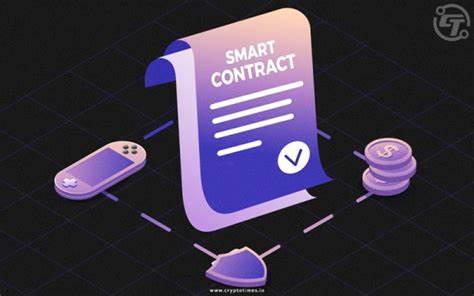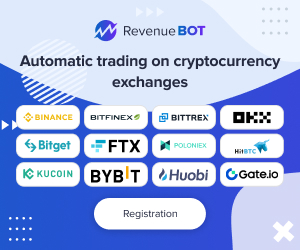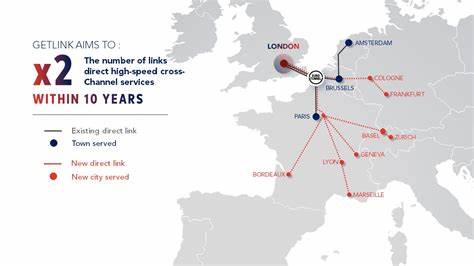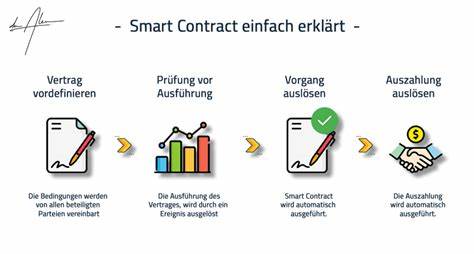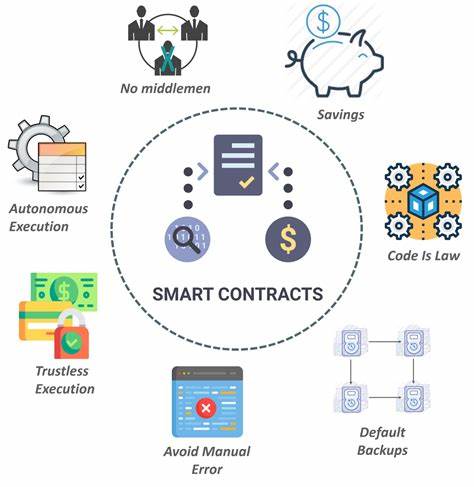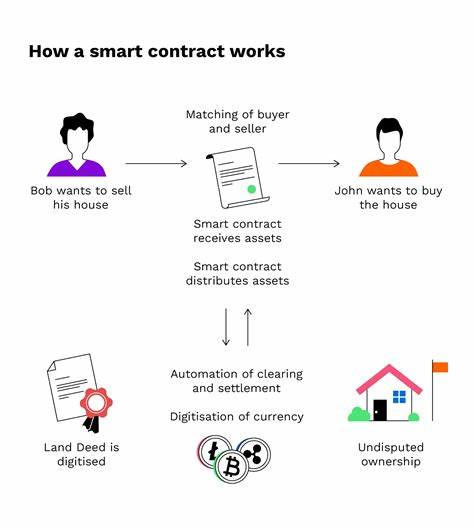Kreative und ausführliche Nachrichtenartikel über das Thema: 10 Real-World Smart Contract Anwendungsfälle - Crypto Times Die Ära der Blockchain hat eine Vielzahl bahnbrechender Ideen hervorgebracht, wobei das Konzept des Smart Contracts als besonders revolutionär hervorsticht. Smart Contracts sind ein bahnbrechender Mechanismus auf Blockchain-Netzwerken, der die Tür zu einer Vielzahl von Finanzprodukten im DeFi (dezentralisierte Finanzierung) Ökosystem geöffnet hat. Der Name mag Bilder von futuristischen Transaktionen hervorrufen, die von robotischen Entitäten verhandelt werden, aber die tatsächliche Essenz von Smart Contracts ist gleichzeitig einfacher und wirkungsvoller als solche Visionen. Im Kern sind Smart Contracts im Wesentlichen digitale Vereinbarungen, bei denen die Bedingungen des Deals direkt in die Software codiert sind. Dies bedeutet, dass sie programmiert sind, um vordefinierte Aufgaben automatisch auszuführen, sobald bestimmte Bedingungen erfüllt sind.
Digitale Währungen haben die Möglichkeiten der Blockchain eröffnet, und Smart Contracts könnten einen breiteren und vielfältigeren Einfluss auf verschiedene Branchen haben. Diese Verträge versprechen Lösungen, die in Transparenz, Sicherheit und Effizienz glänzen. Die potenziellen Anwendungen in der realen Welt sind vielfältig, von der Optimierung von Geschäftsprozessen bis zur Vereinfachung täglicher Transaktionen. Die Erforschung der vielfältigen Möglichkeiten, wie diese Smart Contracts unseren Planeten umgestalten können, ist eine Erkundung wert, während wir voranschreiten. 1.
Supply Chain Management Inherently intricate and multifaceted, supply chains involve the movement of goods across numerous intermediaries before they finally get to the consumer. This multi-step progression can sometimes be cumbersome, slow, and susceptible to errors or fraudulent activities. Enter smart contracts, a technological intervention that promises to refine and expedite these processes. Essentially, a smart contract functions as an automated, self-executing contract where the terms of agreement or conditions are pre-written into lines of code. Imagine a product triggers an intelligent contract upon reaching a designated checkpoint or location.
This contract, in turn, could seamlessly facilitate releasing payments to a supplier without any manual intervention. Similarly, it could automatically send alerts or notifications to the next stakeholder waiting in line in the supply chain, ensuring that goods keep moving without unnecessary delays. A distinguishing characteristic of intelligent contracts within supply chain scenarios is their capacity to keep clear and enduring records. This robust feature offers a valuable advantage: it drastically simplifies the task of verifying the genuineness of products. Consequently, the risks associated with fraudulent activities or the influx of counterfeit products into the supply chain diminish significantly.
Smart contracts offer a potent solution to many challenges contemporary supply chains face. Automating tasks and ensuring transparency and authenticity simplify processes and enhance trust and reliability among all parties involved. 2. Real Estate Transactions Intelligent contracts are revolutionizing the traditional methods of property transactions, which were previously plagued by lengthy paperwork, intermediary involvements, and, at times, steep fees. These digital contracts, based on blockchain technology, can significantly automate and streamline many stages of the buying or renting process.
Imagine a prospective buyer identifying a property they wish to purchase. Instead of going through cumbersome administrative procedures and intermediaries, they transfer the agreed payment to a smart contract. In return, acting as an automated digital intermediary, this contract immediately transfers ownership or access rights to the buyer. This instantaneous exchange eliminates the waiting periods typically associated with property transactions. Additionally, cutting out unnecessary intermediaries offers a more direct and potentially cost-effective marketing method.
Moreover, with every term and condition digitally encoded, there’s reduced scope for ambiguity or misinterpretation, thereby minimizing potential disputes. All these benefits underscore the potential of smart contracts to reshape and refine the real estate industry, making property transactions faster, more transparent, and cost-efficient. 3. Insurance Claims Insurance claims processing has often been a lengthy ordeal due to the necessary verification steps to ascertain the claim’s validity. This can sometimes result in delays, leaving claimants waiting for prolonged periods before receiving their due settlements.
In this context, integrating smart contracts presents a transformative solution that can streamline and expedite the entire process. Smart contracts are self-executing contracts with the terms of the agreement directly written into lines of code. These digital contracts operate on blockchain technology, ensuring transparency, security, and immutability. One of the most promising features of smart contracts in insurance claims processing is their ability to execute actions automatically once predefined conditions are satisfied. A distinguishing characteristic of intelligent contracts within supply chain scenarios is their capacity to keep clear and enduring records.
Upon receiving validated data about the disaster, the smart contract can instantly approve the associated claims without human intervention. This means that beneficiaries can receive aid almost immediately after a catastrophic event, significantly reducing the waiting time and the administrative burden that typically accompanies traditional claims processing. 4. The Evolution Of Direct Transactions: In the decentralized finance realm, direct transactions, notably in the lending and crowdfunding sectors, have gained significant traction, where its integration of smart contracts is a key driver behind this growth. These are essentially programmable agreements that run automatically without any intervention once set.
Their primary function in P2P platforms is to bolster accountability. By design, they hold funds and only release them once certain predefined milestones or conditions are met. This means that before any funds are released, recipients must fulfill their part of the agreement. Such a model makes the entire funding process more efficient and less cumbersome and introduces a level of trust. Lenders and investors can be more confident knowing there’s an automated system in place that ensures they get what they’re promised.
5. Intellectual Property & Royalties: The realm of arts and creativity often gets overshadowed by issues of piracy and intermediaries demanding large percentages of the revenue. Many artists and content creators find a significant portion of their potential earnings lost in this maze. However, the advent of intelligent contracts offers a solution. By setting up these contracts, royalty payments can be automated.
For instance, whenever a digital artwork gets purchased, or a song gets streamed, the associated smart contract can trigger an instantaneous distribution of royalties to the artist or creator. This system ensures artists are compensated fairly and promptly, thus eliminating the role of intermediaries who take away a significant chunk of the earnings. 6. Voting Systems: The very foundation of democracy, voting, has often been plagued by concerns of fraud, manipulation, and a general mistrust in the electoral systems. Here, too, intelligent contracts show promise.
When votes are recorded on a blockchain, they’re essentially immutable. When integrated with smart contracts, conditions for voting can be established. Once these conditions are met, the agreement can independently compute the outcomes. This approach safeguards the system from manipulation and enhances transparency and confidence in the voting process. 7.
Healthcare: The healthcare sector deals with some of the most sensitive and private data: patient health records. Smart contracts, when applied to this sector, can provide a robust mechanism for data management. Data integrity is maintained by encrypting and storing health records on a blockchain. Furthermore, access to this data can be conditional. Through an intelligent contract, access can be provided only when specific conditions are satisfied, like when patients give explicit consent or during emergencies.
This ensures a balance between accessibility and privacy. 8. Gaming and Virtual Goods: The gaming community is buzzing with the trade of virtual goods and in-game assets. Ensuring genuine ownership of these digital commodities is crucial. Intelligent contracts introduce a mechanism to govern these assets.
When a player acquires or wins a rare virtual item, the associated smart contract can confirm, authenticate, and transfer the ownership of that asset directly to the player’s unique blockchain address, thus solidifying their claim. Also Read: What is Crypto Gaming and How to Earn with it? 9. Financial Derivatives: The complex realm of financial derivatives frequently requires intermediaries to authenticate transactions and maintain compliance. However, smart contracts could transform this sector. For example, an options contract.
A smart contract can instantly execute the option if the underlying asset hits a certain price threshold. This ensures both timely execution and increased transparency. 10. Identity Verification: In this digital age, confirming one’s identity has become vital and challenging. Incorporating smart contracts into digital identity systems can streamline the process.
After establishing an individual’s identity on the blockchain, the corresponding smart contract can regulate access to different services based on this authenticated data. This approach minimizes potential fraud and dramatically reduces the hazards linked to identity theft. Also Read: WorldCoin: A Crypto Project Launched by OpenAI’s Sam Altman Fazit Smart Contracts bieten eine revolutionäre Möglichkeit, verschiedene Prozesse in verschiedenen Branchen zu automatisieren, zu vereinfachen und beispiellose Transparenz zu schaffen. Obwohl sie nicht ohne Herausforderungen sind - wie Codierungsfehler, Skalierungsprobleme oder rechtliche Anerkennung - die Vielzahl potenzieller Anwendungen macht sie zu einer überzeugenden Lösung für viele der Ineffizienzen, mit denen wir heute konfrontiert sind. Mit zunehmender Reife der Technologie und einer steigenden Akzeptanz erwarten wir eine Welt, in der das Vertrauen algorithmisch etabliert, Intermediäre minimiert und Transaktionen nahtloser als je zuvor sind.
Auf Google News The Crypto Times folgen, um auf dem Laufenden zu bleiben! TAGS: DeFi Smart Contracts Von The Crypto Times Team Follow: Das Crypto Times-Team besteht aus erfahrenen Autoren, Marktanalysten und Kryptowährungsfans. Wir konzentrieren uns darauf, die neuesten und verlässlichsten Nachrichten und Einblicke in die Kryptowährungswelt zu bringen. Unser Ziel ist es, unseren Lesern auf der ganzen Welt dabei zu helfen, in der sich schnell verändernden Welt der Krypto kluge Entscheidungen zu treffen. Neueste Nachrichten Google-Suchinteresse an „Onchain“ erreicht im Mai ein Allzeithoch Dogita Launch auf Solana Netzwerk und wird auf Latoken gelistet Core Scientific sichert 3,5 Mrd. $ KI-Vertrag mit CoreWeave Thailand SEC genehmigt den ersten Bitcoin ETF für Investoren FOLGE UNS Facebook Twitter Instagram Telegram Linkedin Abonnieren Sie unseren Newsletter, um unsere neuesten Artikel sofort zu erhalten! Empfohlene Nachrichten Die spannende neue Welt des Kryptos und des Wettens 16 Stunden vor Wildziele für Ripple (XRP), BONK, Dogwifhat (WIF) und diese DeFi-Blauchip: Wie viel werden sie steigen? Vor 2 Tagen Starten Sie Ihre profitable Instant-Crypto-Börse Vor 3 Tagen Metaplex & Mutant Labs starten DeFi-Rahmenwerk auf Solana Vor 3 Tagen Verstehen Sie die Kryptowelt mit uns! Fragen Sie sich nie wieder, was in der Krypto-Welt passiert.
Erhalten Sie schnelle und aktuelle Nachrichten, um Ihnen besser zu dienen. Krypto-Nachrichten Bitcoin-Nachrichten Ethereum-Nachrichten Altcoin-Nachrichten DeFi-Nachrichten Marktnachrichten NFT-Nachrichten Blockchain-Nachrichten KI-Nachrichten Markt mit uns Editorial Pressemitteilung Schreiben Sie für uns Firma Über uns Kontaktieren Sie uns Karriere Redaktionspolitik Finden Sie uns auf Sozialen Medien Facebook Twitter Linkedin Instagram Telegram © 2024 Protokolle Und Tokens Pvt. Ltd. Nutzungsbedingungen Haftungsausschluss Datenschutzbestimmungen Dieser vom Crypto Times-Team verfasste Artikel umfasst verschiedene innovative Anwendungen von Smart Contracts, die eine Vielzahl von Branchen revolutionieren könnten. Von der Automatisierung von Versicherungsansprüchen bis zur Vereinfachung von Immobilientransaktionen bieten Smart Contracts viele Möglichkeiten, um Prozesse effizienter und transparenter zu gestalten.
Es bleibt spannend zu beobachten, wie sich diese Technologie weiterentwickeln wird und welche neuen Anwendungsfälle in Zukunft entstehen werden. Mit Smart Contracts könnte eine Zukunft vor uns liegen, in der Vertrauen und Effizienz auf bisher ungeahnte Weise erreicht werden.
